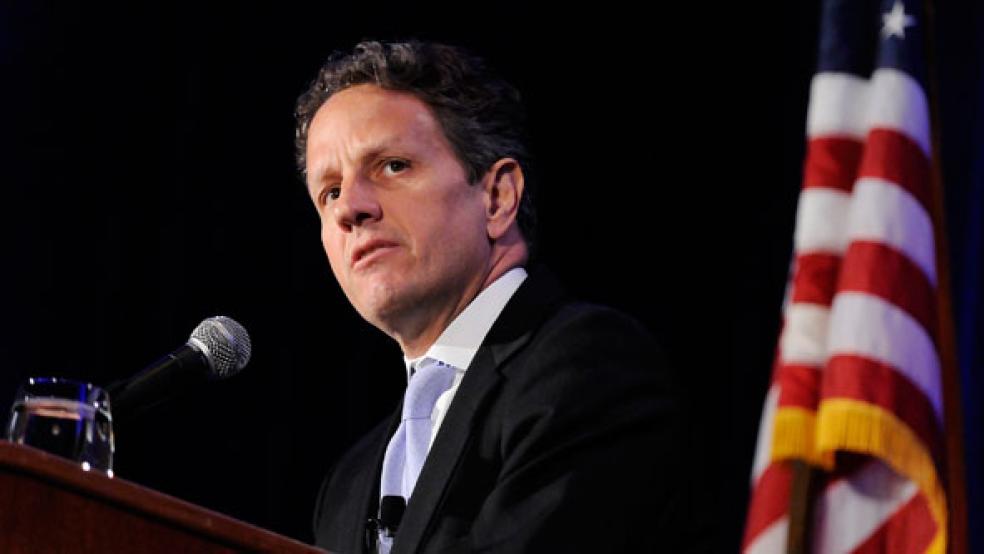The Obama administration and congressional Democrats are returning fire on House Speaker John Boehner and other GOP leaders by dismissing Republican calls for more deep cuts in spending and a renewal of costly tax cuts as the price for raising the debt ceiling.
Treasury Secretary Timothy Geithner and Senate Budget Committee Chairman Kent Conrad of North Dakota, the Democrats said that the Republican plan, which calls for greater austerity and tax relief but no additional revenues to help reduce the deficit, could undermine the fragile economic recovery and push the country back into recession.
In a speech Thursday morning in Baltimore, Geithner sharply criticized what he described as a Republican agenda of “severe, immediate austerity, combined with deep, permanent cuts in education and the safety net for retirees.” He said, "A credible strategy for economic growth requires a willingness to do things, not just to cut things. We have successfully navigated the most dangerous phase of the worst economic crisis in generations.”
In a floor speech yesterday as Democrats and Republicans dueled over budget policy, Conrad defended the Obama administration’s record of leading the country out of the worst financial meltdown and recession of modern time, 26 consecutive months of private sector growth, 11 consecutive months of real GDP growth and a gradual decline in the unemployment rate.
“When our [Republican] friends attack the President and say he did not lead -- really?” Conrad said. “He averted a depression. He prevented a financial collapse, because that is exactly where we were headed when the Republicans were in control.”
Conrad said that instead of building on these successes, the Republicans “want to take us to extreme austerity” and “slam on the brakes, even while this economy is in a fragile recovery. “We do not have to wonder what would happen if we adopted the policies they are presenting here on the floor of the Senate today, he said. “We do not have to imagine it; we can just look across to Europe because they are pursuing the policies that our colleagues on the other side advocate here today."
The Democrats were responding to Boehner’s speech Tuesday demanding once again that President Obama and the Democrats go along with trillions of dollars in additional cuts and savings to match another boost in the debt ceiling. Boehner also vowed to schedule votes before the election on the heart of the Republican economic policies, including an extension of the two Bush-era tax cuts, and other major tax reforms – but without increasing tax rates on the wealthy, as Obama has insisted.
The GOP controlled House yesterday approved legislation to cut $310 billion from the deficit over the coming decade – much of it from programs for the poor and lower income Americans – and shift some of those savings to the Defense Department to avert automatic spending cuts scheduled to take effect early next year. The House earlier this year adopted a budget blue print drafted by Rep. Paul Ryan, R-Wis., which would cut spending by $5 trillion more than Obama’s plan over the coming decade and would overhaul Medicare, Social Security and other entitlement programs.
Ryan, citing the slow economic recovery and towering national debt, said yesterday that Obama’s policies are “not working” and need to be changed. “We need to grow the economy” instead of raising taxes, he said.
Geithner in his speech urged the Republicans to lower the political rhetoric and abandon their unalterable opposition to combining spending cuts with some additional tax revenue, noting, “There is no Democratic or Republican fiscal math.”
“If you try to restore fiscal balance without a penny of additional revenue, then you have to cut deeply—too deeply—into critical functions of government,” he said. “Just one example—the cost of extending the Bush tax cuts for the top 2 percent of earners for the next decade is about one trillion dollars. Tax cuts do not pay for themselves. You have to pay for them. We can’t afford to borrow the money to extend those tax cuts, and we won’t agree to cut benefits for seniors or cut investments in education to pay for those tax cuts.”





